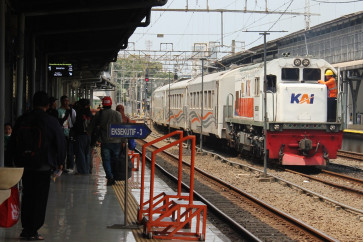Popular Reads
Top Results
Can't find what you're looking for?
View all search resultsPopular Reads
Top Results
Can't find what you're looking for?
View all search resultsGrab paves way for expansion with acquisition of Kudo
Malaysia-based ride-hailing application Grab has announced the acquisition of assisted e-commerce platform Kudo in a deal that is part of its masterplan for 2020 to invest up to US$700 million in Indonesia to help expand the country’s digital economy
Change text size
Gift Premium Articles
to Anyone
M
alaysia-based ride-hailing application Grab has announced the acquisition of assisted e-commerce platform Kudo in a deal that is part of its masterplan for 2020 to invest up to US$700 million in Indonesia to help expand the country’s digital economy.
Through the acquisition announced Monday Grab plans to support and accelerate the expansion of Kudo’s agent network, while also leveraging Kudo’s reach to bring more riders, drivers and users onto its platform.
Other plans on the agenda include expanding Kudo’s financial services, such as insurance and consumer loans.
While Grab has not disclosed the exact price of the deal, a report published earlier by Reuters cited a person saying Grab was planning to pay more than $100 million for Kudo.
The Kudo platform is to be integrated into Grab’s mobile payment platform, GrabPay, a feature operated in collaboration with regional banks that enables Grab users to make cashless payments for the service.
“Combining Kudo’s innovative online-to-offline [O2O] e-commerce solution and extensive agent network with GrabPay’s vast consumer base will advance our mission to provide millions of people in Indonesia with increased access to convenient cashless payments and new income opportunities,” Grab president Ming Maa said in a statement.
Kudo CEO Albert Lucius, meanwhile, noted that the acquisition would create close cooperation between GrabPay and Kudo’s existing business.
“Grab shares our vision of creating payment solutions that empower the unbanked to benefit from the rapid growth of e-commerce,” he said.
Albert co-founded Kudo with his high school friend Agung Nugroho in 2014.
After spending years on different career paths, the two met again a few years ago when pursuing master’s degrees in the United States. Enchanted with the rapid growth of e-commerce in their home country, Albert and Agung got the idea to develop a technology platform that can connect online merchants with offline customers nationwide. They later named it Kudo, an acronym of the Indonesian words “kios untuk dagang online” (online shopping kiosk).
While many e-commerce platforms focus on attracting end users making online purchases, Kudo has come up with a different idea, targeting those who do not have credit cards, or even bank accounts, to make transactions through so-called “agents.”
“The app has been introduced to enable all people to access e-commerce and help them become entrepreneurs,” said Agung, the company’s chief operating officer, in an interview with The Jakarta Post in August.
The country’s startup industry continues to attract foreign investors, with the biggest funding ever for a local startup going to local ride-hailing app Go-Jek in last August as US private equity firms KKR and Warburg Pincus invested $550 million.
Given the infamous track record of public transportation in Indonesia, ride-hailing apps like Go-Jek, Grab and Uber, which offer competitive prices and traceable services, are the new darlings among Indonesian customers.
Their business, however, has sparked strong opposition from operators of formal public transportation services, such as taxis, buses and public minivans, and informal ones like ojek (motorcycle taxi).
To ease the tensions and better regulate the industry, the Transportation Ministry has revised Regulation No. 32/2016 on taxi businesses that, among other things, regulates fleet sizes and establishes price floors for car-hailing services.
University of Indonesia (UI) economist Fithra Faisal Hastiadi sees Kudo’s acquisition as a starting point for Grab to diversify its core business and be more than just a “ride-hailing service provider.”
“Through this acquisition, Grab is taking over Kudo’s established ecosystem. This will pave the way for Grab to expand its operations, for example to e-commerce, with a focus on consumers who have no bank accounts,” he told the Post. (yon)



